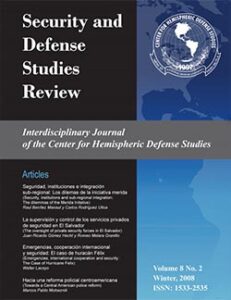The provision of private security services challenges conventional wisdom about the role of the State as the guarantor of public security. Taking into account the weakness or absence of effective legal structures and regulating entities, such non-state activities pose serious questions about lawfulness, legitimacy, and responsibility in the security area. If the security provided by police forces is not reliable, citizens will tend to resort to private security services (PSS) or to supply themselves with arms in order to protect themselves, speeding up the decline of state monopoly on the legitimate use of force. In El Salvador, PSS monitoring and control focus on this area. By means of systematically analyzing the phenomenon, its main elements and the dynamic interrelationship among them are presented as a means of determining whether the system provides the required levals of transparency and the democratic standards regarding the operations and behavior of the PSS. The research presented is aimed at bringing Salvadoran expertise in these matters into the debate on PSS monitoring and control, a useful exercise in part because it shows, from the vantage point of primary sources, the Salvadoran experience with systems of monitoring and control.

